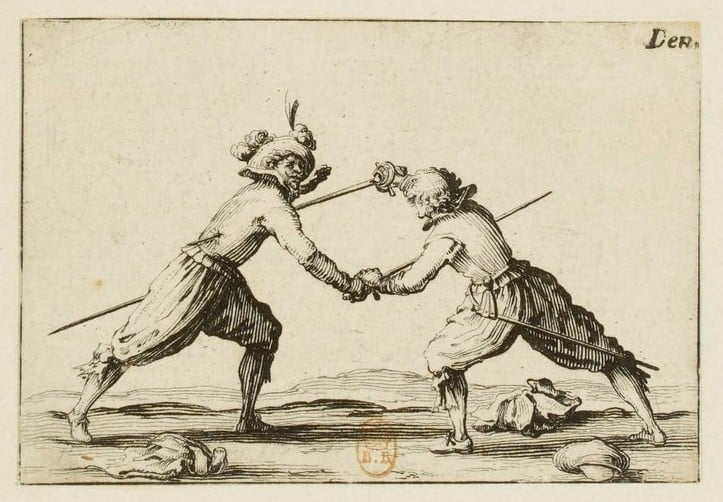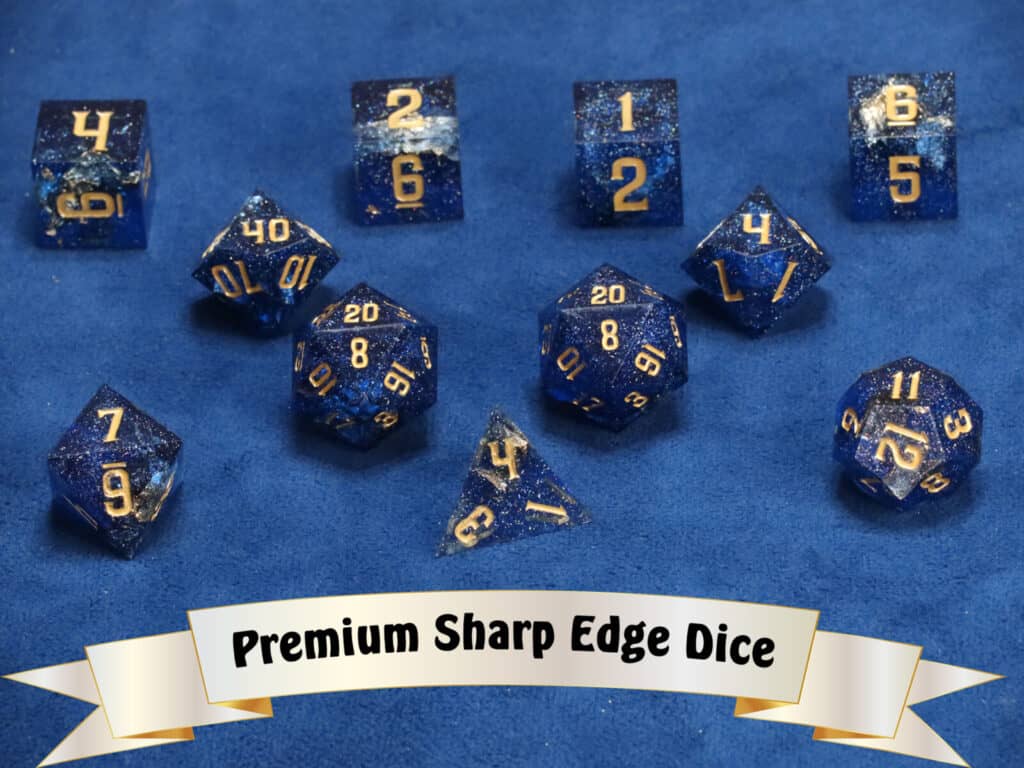The 5E Defensive Duelist feat is a strong one that can be cool both on a mechanical basis as well as fit well into a fighting style roleplay of the right melee character build. This feat is from the original Player’s Handbook and often gets overlooked from melee fighters because the feat doesn’t sound fancy – but it’s actually very powerful. Especially when built into a melee character who takes this feat into consideration with stat and weapon choices.
So is 5E’s Defensive Duelist feat worth it?
The Defensive Duelist feat from 5E DnD is an excellent feat for melee classes that don’t use their reaction like monks, fighters, and melee-based rangers. The extra AC turns enemy hits into misses and this feat scales with the character, making it strong for every level of campaign.
This is a very powerful little gem of a feat for multiple reasons for those classes or builds designed to use it, but its it right for you?

Breaking Down the Defensive Duelist Feat
There are a few things to know about the defensive duelist feat. The immediate summary:
- Your character must have a Dexterity score of 13 or higher
- The weapons must be a finesse weapon (likely rapier, scimitar, or low-levels short sword) meaning you may have to pass up on higher damage weapons to use a weapon that qualifies for use with this feat
So let’s break this down further.
Directly from the Player’s Handbook:
When you are wielding a finesse weapon with which you are proficient and another creature hits you with a melee attack, you can use your reaction to add your proficiency bonus to your AC for that attack, potentially causing the attack to miss you.
Prerequisite: Dexterity score of 13 or higher
PHB p.165
The benefit here is pretty easy to break down because this isn’t a feat that gets its value from being complex or offering a buffet of benefits. It’s straight to the point and it’s solid.
Benefit #1: You can add your proficiency bonus to AC when hit with a melee attack, causing that attack to miss.
There are many melee classes that have no spells or actions that can be used with their Reaction, meaning that for all intensive purposes they have no reaction. If you’re not a spell caster casting shield or counterspell, or a rogue doing all the amazing things a rogue can do, chances are reaction doesn’t come up to often.
Especially at lower levels.
This is one of the feats that really works. First the player gets to know if they are hit or not before deciding to use the feat.
Let’s not underestimate how important this is. This allows the player to know whether or not the added AC from the feat will turn a hit into a miss or not. That’s a powerful thing.
Second, the 5E defensive duelist feat scales. The first time a player gets a feat, or from level one if playing the variant human, it starts out as just a +2 for AC because that’s where your proficiency is. But since proficiency goes up, so does the power of this feat. Even at epic level campaigns since a +6 is nothing to sneeze at – even against level 20 foes.
Third, many classes have no reaction. They have actions, they likely have bonus actions, but no reaction. That means this feat is almost a “freebie” during a player’s turn as opposed to a bonus action feat where they might have to decide against doing 1 or 2 other things before settling on using the feat.
As a reaction, it’s just an obvious bit of free AC when needed while the bonus action and action remain untouched.
That is potentially pretty powerful.
The limiting factors on who wants this depends mostly on:
- Type of weapon used in melee (most melee characters don’t use finesse weapons – however it’s worth noting the common belief that finesse = Dex-based is NOT true as finesse weapons can use STR or DEX – player’s choice)
- Whether or not the class has great uses for reaction (see rogue as a class that would not be a good fit here despite it looking good at first glance)
- If the character melees enough to make this better than other feat options

5E Classes That Should Take the Defensive Duelist Feat
The monk stands out as a class that should always consider the defensive duelist feat. First, their starting weapon proficiency includes short swords. So even if you have a really by the book DM who won’t make exceptions on small details that many of us ignore at the table, short swords are a finesse weapon. Monks are good off the bat.
Second, the minimum DEX score should be no issue at all considering it’s one of the main stats needed for a good monk. If you’re below 13 even at level one then that character probably shouldn’t be a monk.
Monks are a melee class that don’t get a d10 and rely on mobility, so being able to avoid a few more hits is crucial. Especially since as DM I’ve noticed (and other DMs have said the same) that if a PC dies early in a campaign that wasn’t meant to be super brutal for some reason it’s the monk. Defensive Duelist is a natural feat for a class that needs to get up close to do damage but can’t take the beating of their armored or barbarian compatriots.
Beyond the monk there are a couple other builds that could work well. If you were playing a fighter that was going to use finesse weapons like scimitars instead of longswords or axes, this makes a lot of sense as one of the extra ability score boost or feats that fighters can pick up. If it thematically fits, then why not add a reaction that adds to your already (likely) impressive AC?
The rare and exotic melee-based ranger could also do very well with the Defensive Duelist feat, especially if they choose Stand Against the Tide or Evasion for a class feature as opposed to Uncanny Dodge. This gives another option for avoiding danger if you envision the popular ranger archetype of hurtling through swarms of enemies, scimitars swirling as they dodge and whirl through danger.
I you are going any of these three routes, you should strongly consider this feat. Great potentially for flavor, and in the narrow space it is great mechanically, as well.
5th Ed Classes that should always consider taking the Defensive Duelist Feat:
- Monk
- Fighter (Dex-based)
- Ranger (Melee-based)
5E Classes That Should Consider Taking the Defensive Duelist Feat
For most melee character builds the quality of most feats depends on the build. Defensive Duelist is incredibly powerful for builds that use it – but it may come at the cost of using a 1d6 weapon or 1d8 weapon versus a 1d10 or the magic weapon that is available. If Defensive Duelist was allowed for any melee weapon it would be taken by every melee class except rogue.
So why is using a finesse weapon such a restriction? Well….
Finesse weapons (as labeled in the PHB):
| Finesse Weapon | Damage |
|---|---|
| Dagger | 1d4 piercing |
| Dart | 1d4 piercing |
| Rapier | 1d8 piercing |
| Scimitar | 1d6 slashing |
| Shortsword | 1d6 piercing |
| Whip | 1d4 slashing |
When you look at the damage dealt, usually the only finesse weapons in use will end up being the rapier unless someone is willing to use slightly weaker weapons for the sake of flavor, what’s available in their campaign, or if the early magic weapons or items are like a +1 magic scimitar or something of the sort.
And darts don’t even apply, and I know DMs who would take a long look at whip (though personally I love imagining the look of how this work so as a DM of several years at this point I’d allow it).
In other words, these aren’t the weapons that are world breakers by themselves. Most clerics or paladins in our campaigns have played as heavy armor tanks that used a battle hammer or nature clerics using shillelagh, meaning these aren’t the weapons they are likely to choose to use.
Because of that most classes on this list will be using different weapons that won’t make this feat as useful. However, if dual-wielding short swords, rapiers, or other finesse weapons chosen for thematic reasons is right up the build you have created for a melee character then this is a feat worth considering.
It all depends on the build you go with here, as well as how important other feats are to you, possibly based on stat rolls. This would apply to characters like rangers in a 3-person party where they have to do ranged and melee.
5th Ed Classes that should consider taking the Defensive Duelist Feat:
- Cleric
- Paladin
- Ranger
- Warlock (Hexblade, Pact of the Blade)
- Wizard (Melee-based)
5E Classes That Should NEVER Take the Defensive Duelist Feat
Classes that aren’t going to be engaging in melee combat or who have commonly used reactions (looking at you “counterspell” and “shield” casting melee wizards) aren’t going to want the defensive duelist feat. Likewise, there’s the rogue whose uncanny dodge alone is a good reason to not use up their reaction. There are also times where based on party composition, feats, and boons that a second sneak attack can occur via reaction so rogues don’t make sense.
Any melee class not using finesse weapons should ignore this feat, as should casters. There are some classes that tend to have finesse weapons (bard) but if your bard is in melee combat things have gone horribly, horribly wrong. The following classes just don’t have a good reason for considering this feat.
5th Ed classes that should never take the Defensive Duelist Feat:
- Artificer
- Barbarian
- Bard
- Druid
- Rogue
- Sorcerer
- Warlock (other than hexblade)
- Wizard (non-melee)

Final Feat Grade for Defensive Duelist 5E
Defensive Duelist Feat Grade: B+
Is the 5E Defensive Duelist Feat Worth It?
I really struggled to figure out where to put this feat. Because for the builds it applies to, it is insanely powerful. The ability to just make attacks miss with a reaction that otherwise wouldn’t be used is pretty next level. The fact it scales means a melee fighter at high levels when they would already have a very high AC and then to add a +6 means even many high level enemies will struggle to land a hit.
So when it applies, it’s an A or even A+ feat. But because it’s only melee, and melee with finesse weapons, reigns it back in a bit. Which is fair, because otherwise it would be serious OP levels of broken. But most classes can’t use it effectively, and you don’t see high level magic weapons that are finesse weapons unless your DM is friendly with the custom made ones.
However, for monks or melee class builds that want to use finesse weapons (other than the rogue) the defensive duelist feat in 5E is an incredibly powerful feat. Add in Lucky (for DMs who don’t ban it) and enemies are going to have an incredibly hard time ever landing a shot.
Defensive Duelist Feat FAQ
Does the enemy have to hit you before you can use the defensive duelist feat?
There’s no reason to use this feat as a reaction until a hit lands. But that’s the advantage of the feat: the player can see if using this reaction would allow them to dodge the attack or not. If it doesn’t, don’t use it. If it does, then use it. But a player does not have to take damage before activating this feat.
Can you use defensive duelist and a shield in 5th Edition DnD?
The only requirements for defensive duelist is having a minimum Dex score of 13 and using a finesse weapon. That means a PC can absolutely use a shield and this feat at the same time.
Can you use defensive duelist while dual wielding in 5E DnD?
Players can dual wield and use defensive duelist at the same time. In fact, with the way that defensive duelist is written, the image of a dual wielder using advanced melee tactics to deflect an attack fits right in!
Should I take Uncanny Dodge or Defensive Dualist for my ranger?
The key here is to look at the other options that the ranger gets when Uncanny Dodge becomes available. It depends on the campaign, but the combination of Evasion (instead of Uncanny Dodge) plus defensive dualist is arguably the better/stronger combination.
Other DnD Articles You Might Enjoy
- Crusher Feat 5E Guide
- 5E Keen Mind Feat Guide
- 5E Alert Feat Guide
- 5E Is Skilled Feat Worth It?
- How Do Hit Dice Work in DnD?
- Best 5E Feats for Rangers

Proud to embrace the locally created moniker of “Corrupt Overlord” from one of the all time great Lords of Waterdeep runs, Shane is one member of the Assorted Meeples crew and will be hard at work creating awesome content for the website. He is a long-time player of board games, one time semi-professional poker player, and tends to run to the quirky or RPG side of things when it comes to playing video games. He loves tabletop roleplaying systems like Dungeons & Dragons, Pathfinder, Werewolf, Fate, and others, and not only has been a player but has run games as DM for years. You can find his other work in publications like Level Skip or Hobby Lark.
